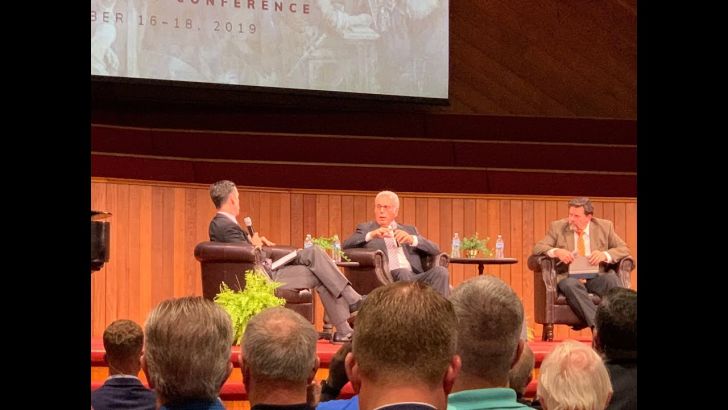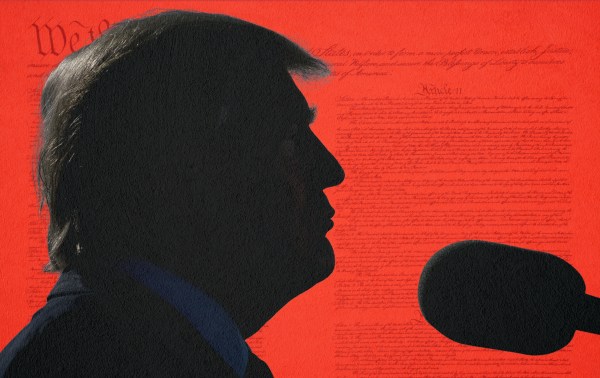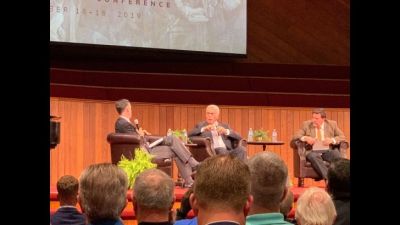Greetings, readers of The Morning Dispatch. We’re thrilled to share with you the first newsletter from our senior editor, David French, whose writing on politics, culture, and law have long commanded the attention of leaders on Capitol Hill, the White House, the Supreme Court and throughout Washington. If David is widely read inside the Beltway, he’s not at all of the Beltway. He resides in Tennessee with his family. David will be writing twice weekly and, for the time being, we’ll be providing it to readers who asked for more information on what we’re doing and those who signed up to receive The Morning Dispatch. You will continue to receive TMD early on Monday, Wednesday and Friday. And you’ll get David’s as-yet-unnamed newsletter on Tuesdays and Thursdays, midday Eastern Time. Soon, you will be able to choose to receive all of our newsletters and podcasts, individually or in one customized email, or just the ones that you want. For now, we hope you enjoy what we send.—Steve Hayes
Welcome to my very first newsletter at my new home. After two full days of slothful unemployment following my departure from National Review, I’m back in the fray. And while I can’t possibly match Jonah’s legendary G-file (my couch doesn’t talk to me, for one thing), I’ll do my best.
I also don’t have a name for this thing yet, so I need your help. Send me a DM on twitter (@DavidAFrench) with a suggestion. The winning entry gets zero dollars, and zero Dispatch swag, but it will get a public shout-out (if you want it), and the resulting undying enmity of Catholic integralists everywhere.
Here’s the format for now: Twice per week I’m going to populate your inbox with reporting, analysis and commentary on key political, cultural, and legal stories of the week. Some days we’ll hit the trifecta. Some days we won’t. I won’t force it if there’s a slow news cycle (remember those?), but this cycle’s not slow, so buckle in. We’ve got lots to talk about. I’m going to try to answer three questions:
Is Bill Taylor’s Ukraine testimony as important as the media seems to think?
Why did Christian Twitter erupt over seven minutes of snark?
If President Trump shoots someone on Fifth Avenue, are the cops barred from even investigating the crime?
1. The Meaning of Bill Taylor’s Tale
On Tuesday, I spent a long delay in Reagan Airport doing what every self-respecting political nerd should do—cross-referencing Bill Taylor’s opening statement with other available evidence in the Ukraine investigation, including the whistleblower complaint, the memorandum of President Trump’s call with Volodymyr Zelensky, Mick Mulvaney’s press briefing, and Ambassador Gordon Sondland’s opening statement.
As I reviewed the evidence, it struck me once again how this investigation is proceeding in a fundamentally different way from previous presidential scandals. In both Watergate and Clinton’s impeachment, the investigations built slowly until a breakthrough—the Nixon tapes and Monica Lewinsky’s blue dress. Eventually, the evidence of long-denied presidential misconduct was overwhelming. All that was left was debating (and imposing) the consequences.
In the Ukraine scandal, everything is backward. Yes, there was news of an (unseen) whistleblower complaint, and there was a Wall Street Journal story about Trump’s alleged request that Ukraine investigate Joe and Hunter Biden. But it was mere days, not months, before the administration itself basically released the tapes. It gave journalists the blue dress. It put a memorandum in the public square that showed, in six successive paragraphs, an extraordinary exchange:
First, Trump complains about a lack of reciprocity in America’s relationship with Ukraine.
Second, Zelensky mentions that Ukraine is “almost ready” to purchase Javelin missiles.
Third, the very next words out of Trump’s mouth are “I would like you to do us a favor, though,” and he proceeds to ask for ask for Ukrainian assistance in investigating a bizarre conspiracy theory related to the 2016 election.
Fourth, Zelensky responds by saying, “[I]t is very important, and we are open for any future cooperation.”
Fifth, Trump asks Zelensky to work with Rudy Giuliani, says, “The other thing” (implying this is still part of his favor) and asks Ukraine to “look into” matters involving Joe and Hunter Biden.
Sixth, Zelensky responds favorably, saying that his new prosecutor “will look into” the situation.
Just as there is no good explanation for the Watergate tapes or the blue dress, there is no good explanation for this communication with a desperate, dependent American ally. It’s bizarre to ask an ally to investigate a conspiracy theory, and it’s corrupt to ask an ally to work with the president’s personal attorney to investigate a political rival. It’s especially troubling when these requests are “favors” demanded in response to that ally’s need for vital military aid.
Regarding Biden, it’s important to note that Trump was not asking Ukraine to assist in an ongoing, lawfully-initiated Department of Justice investigation. To borrow from the old Soviet-era saying, he was showing Ukraine the men. Now he wanted Ukraine to show him their crimes.
From the moment we read the memorandum, we knew there was misconduct. The next question was simple, “How bad was this?” The best-case scenario was already largely-contradicted by the available evidence. At best, the call represented “Trump being Trump” in his free-association communication style, and any damage created by his communication would be swiftly and neatly cleaned up by professional diplomats.
The worst case scenario followed the contours of the whistleblower complaint — that Trump was distorting American diplomacy (even to the point of withholding military aid), including by running a parallel diplomatic effort through his personal attorney, in an effort to prove a conspiracy theory and cripple the political fortunes of a potential presidential rival.
The best-case scenario is embarrassing, corrupt, and incompetent, but it’s not truly impeachable—especially not this close to a presidential election. The worst-case scenario is absolutely impeachable, even if it takes place within months of an electoral contest.
When you assemble the available evidence, the worst-case scenario is now increasingly plausible. It may even be likely. I won’t rehash all the allegations in Taylor’s opening statement (the Morning Dispatch hits the high points nicely, including laying out the alleged explicit quid pro quo of approving American military aid in exchange for investigating the Bidens and Trump’s conspiracy theory), but let’s imagine a scenario suggested to me by a GOP friend on the Hill. Let’s imagine that the president’s memorandum came out after Taylor’s testimony—would it not be viewed as blockbuster corroboration of the central themes of Taylor’s story? Would it not decisively undermine key administration defenses?
Consider the administration’s best defense—that when it demanded investigations, it was primarily concerned with general, systemic corruption in Ukraine, not with specific issues regarding a mythical server or Hunter Biden’s business activities. This is the heart of Ambassador Sondland’s argument. In his opening statement he said this:
Corruption poses challenges to the legitimacy and stability of government; corruption is also an economic issue. Successive Ukrainian governments have sought to attract Western investors as a counterbalance to Russian interference and oligarch control of key Ukrainian companies. Western investment is fully in the strategic interests of the United States and our EU partners. However, efforts to access private markets have been made extremely difficult by the long-standing corruption.
That’s all true. America and our European allies have been concerned that aid could be squandered by corruption, and efforts to make sure that aid and investments are spent ethically and responsibly are in our national interests.
But is that what Trump means when he talks about corruption? Combine Taylor’s statement with the transcript of Trump’s call with Zelensky, and it appears that “corruption” is Trump-language for the server and the Bidens. Indeed, that’s exactly the “corruption” that the president of the United States focused on. If the Trump transcript had dropped after Taylor’s testimony, it would bolster Taylor, not Sondland. It would rightly be viewed as an extraordinary bombshell. It is an extraordinary bombshell.
Since impeachment is about politics more than evidence, let’s end this section of the newsletter with two interesting comments in the Senate. First, Mitch McConnell didn’t exactly throw Trump under the bus on Tuesday, but he did put his hand on the small of Trump’s back as the bus whizzed by—perhaps to demonstrate to Trump the extent of his power. He publicly contradicted Trump’s claim that McConnell had told Trump that Trump’s call with Zelensky “was the most innocent phone call that I’ve ever read.” McConnell denied having “any conversations on that subject.”
The second intriguing comment came from John Thune:
Does this mean the Red Wall is cracking in the Senate? Hardly. While the chances of impeachment are very high, the chances of removal remain vanishingly low. If Taylor’s testimony is contradicted or debunked in any material respect, the chances of removal will be lower still, but for the first time since the Ukraine scandal began, I could at least see the possibility of a meaningful (though not decisive) number of GOP defections if and when the Senate counts the votes.
2. Seven Minutes of Christian Snark
It’s not every day that a short audio-only YouTube video of a panel discussion with Christian pastors and theologians racks up more than 300,000 views in a mere five days, but when a famous Baptist pastor scornfully dismisses one of the most prominent women in the Southern Baptist church, it’s going to catch fire.* Here’s the clip:
For those who don’t have seven minutes to spare, it features Christian pastor and teacher John MacArthur playing a form of word-association game at a conference at Grace Community Church in Sun Valley, California. He’s asked about popular Christian author and speaker Beth Moore. His response? “Go home.”
The audience erupts in laughter and cheers. He continues, “There is no case that can be made biblicly for a woman preacher. Period. Paragraph. End of discussion.” Other panelists chime in, calling her “narcissistic,” saying that she preaches herself, not Christ.
MacArthur then says that just because she has “hawking skills” or the skill to sell jewelry, that “doesn’t qualify you to preach.” He says the church is “caving in to women preachers.” He says the #MeToo movement “is the culture reclaiming ground in the church.” He also condemned a resolution at the most recent Southern Baptist Convention that addressed critical race theory and intersectionality.
For the record, Moore is not a pastor. She will sometimes speak in churches, but she does not lead a church. But when she does speak in church—especially if it’s on Sunday morning—she creates controversy.
There’s a lot going on here, much of it opaque to those outside the Evangelical church. But let me try to explain what happened and why it’s significant. Let’s deal with the “easy” part first—the role of women in the Evangelical church. I say “easy” not because the issue is remotely easy to deal with, but rather because it’s easy to explain.
Bible-believing Evangelical churches (including, of course, the Southern Baptist church) generally adhere to a view of men and women that’s described as “complementarian” rather than “egalitarian.” While books are written about these concepts, a shorthand way of describing complementarianism is that it holds that while men and women have equal worth in God’s eyes, they have different, mutually supportive roles in the church and home.
To make this concrete, in a complementarian church, you won’t see women serve as senior pastors or as elders. Women generally won’t preach on Sunday morning, and they won’t govern the church. Short of that general point of agreement, the actual practice of complementarianism can vary significantly from church-to-church, even within the same denomination.
Can women read scripture publicly? Serve as deaconesses? Teach Sunday school? Host a marriage and family conference at the church that men and women attend? If you want a brief primer on the various scriptural arguments, I’d urge you to read this piece from Todd Still, dean of Baylor University’s Truett Theological Seminary.
Egalitarians, by contrast, see no real distinctions between men and women—at least regarding their role in church. At egalitarian churches, women will lead, they’ll preach, and they’ll serve as elders.
I’m not going to adjudicate the dispute (this newsletter is already running long), except to say that it’s often puzzling and infuriating to people outside the church and omnipresent within the church. I can remember spending hours debating these same issues at my Christian college, and it was debated for generations before me. I have no doubt that Bible-based churches will continue to debate the issue for generations to come.
Discussions (or defenses) of complementarianism aren’t remotely problematic by themselves—after all, Protestants can be a disputatious lot—but the segment generated outrage not just because of its content, but also because of its manner. It was a Hannity segment, not a pastoral or theological discussion, and it revealed the extent of worldly influence on the segment of the church that’s often most proud of its devotion to scripture.
Micah 6:8 requires believers to “do justice,” but it also requires them to “love kindness” and “walk humbly” before the Lord. The MacArthur discussion looked far more like an effort to “own” the alleged libs than it looked like an effort to balance the quest for justice with the imperatives of grace.
But the problem goes deeper than manner. Note how MacArthur reflexively attacks the #MeToo movement. On first glance, this is a puzzling choice. There is nothing inherently un-Christian about a movement that has mainly exposed celebrity rapists and mainstream media Lotharios. It has also exposed abuse within the church, but no Christian leader should turn away from the reality of sexual misconduct from the pulpit and in the pews.
In fact, by revealing the secrets lurking in the dark corners of Hollywood, the movement has done more than a generation of preachers thundering from the pulpit to discredit many of the people and institutions that used to sneer at the very Christians who were laughing with MacArthur in that room.
Yes, there have been excesses. There are excesses in every human movement. But one suspects—especially when combined with MacArthur’s mention of the Southern Baptist resolution on intersectionality—that the goal is to slam the door on any secular left influence on the church, regardless of its virtues.
But if one actually reads the SBC resolution, you can see that MacArthur hardly does it justice. It reaffirms, time and again, the primacy of scripture and the fact that “common salvation in Christ” is our “truest and ultimate identity.” The following passages are key:
RESOLVED, That the messengers to the Southern Baptist Convention meeting in Birmingham, Alabama, June 11–12, 2019, affirm Scripture as the first, last, and sufficient authority with regard to how the Church seeks to redress social ills, and we reject any conduct, creeds, and religious opinions which contradict Scripture; and be it further
RESOLVED, That critical race theory and intersectionality should only be employed as analytical tools subordinate to Scripture—not as transcendent ideological frameworks.
In plain English, that means Baptists can use insights gained from various academic theories (if those theories help us understand and explore truth) to help explain the world around us, but they cannot and must not subordinate scripture to ideology. This is a completely orthodox and practical expression of what’s called “common grace,” the idea that there can be “truthful insights found in human ideas that do not explicitly emerge from Scripture.”
Yes, it is true that Christians can be so open to “human ideas” that they neglect the primacy of scripture, but it’s also true that Christians can be so closed to those same ideas that they’re unable to see truth. A pastor who’s open to Fox News combativeness but closed to uncomfortable truths is not in a position to sneer at anyone—much less a woman like Beth Moore.
3. Open Fire, President Trump
Are you still with me? Good. Let’s close with something quick. On Wednesday, Donald Trump’s attorneys argued to the Second Circuit Court of Appeals that the president is not just immune from prosecution for state crimes while in office, he can’t even be investigated—not even if he shoots someone on Fifth Avenue. Here’s the audio of the exchange:
Manhattan District Attorney Cy Vance has subpoenaed Trump’s financial records as part of his investigation of the Stormy Daniels hush-money payments, and Trump’s attorneys are resisting the subpoena in part by arguing that the president enjoys total immunity from state investigations while in office. Even in the face of obvious evidence of criminal wrongdoing, an investigation has to wait until the president leaves the White House. The judge seemed skeptical. I have three thoughts.
First, there is no single provision of the Constitution that grants the president explicit immunity from state legal process. Indeed, there is relatively recent judicial precedent holding that presidents don’t have a right to defer federal civil litigation until after their presidency. Nor do they have the power to ignore federal subpoenas while still in office. This paragraph, from Clinton v. Jones, is instructive:
[I]t is also settled that the President is subject to judicial process in appropriate circumstances. Although Thomas Jefferson apparently thought otherwise, Chief Justice Marshall, when presiding in the treason trial of Aaron Burr, ruled that a subpoena duces tecum could be directed to the President. United States v. Burr, 25 F. Cas. 30 (No. 14,692d) (CC Va. 1807). We unequivocally and emphatically endorsed Marshall's position when we held that President Nixon was obligated to comply with a subpoena commanding him to produce certain tape recordings of his conversations with his aides. United States v. Nixon, 418 U.S. 683 (1974). As we explained, "neither the doctrine of separation of powers, nor the need for confidentiality of high-level communications, without more, can sustain an absolute, unqualified Presidential privilege of immunity from judicial process under all circumstances."
In Clinton’s and Nixon’s cases, the presidents were contesting federal proceedings—federal civil litigation and a federal subpoena. Trump’s case involves a state investigation. I’m skeptical that this distinction is enough to grant the absolute right of delay to Trump, but it is a distinction nonetheless.
Second, even if Trump doesn’t enjoy an absolute right to defer a response to the subpoena until after his presidency, that doesn’t mean that DA Vance will automatically prevail in his efforts to obtain Trump’s financial records. The right to issue investigatory subpoenas is still limited by applicable state laws and by the First Amendment.
A subpoena as an act of political retaliation would be plainly unconstitutional. For example, in 2017 a New York Court of Appeals limited the scope of an attorney general subpoena aimed at New York crisis pregnancy centers, on the grounds that overbroad document request had a “chilling effect on its associations with employees and with future clients.” Thus, even if Trump loses on his maximalist constitutional argument, the fight is far from over.
Finally, the Second Circuit will not be the final word. Trump and Vance have reached an agreement that could fast-track the case to SCOTUS. If Trump loses the case at the appellate court, Vance won’t enforce the subpoena so long as Trump appeals to the Supreme Court within 10 days and seeks review in the current term. By this summer it’s entirely possible that Donald Trump will join his predecessors Richard Nixon and Bill Clinton in setting a Supreme Court precedent that will help define the extent to which presidents enjoy unique privileges as a benefit of their high office.
***
Thank you for reading, and don’t forget to DM me (@DavidAFrench) with ideas for naming this newsletter. I’ll be back again, on Tuesday, with more thoughts, more analysis, and maybe—just maybe—the only review of Joker that you’ll ever need to read.
*Correction, October 24: John MacArthur was incorrectly described as a Southern Baptist pastor.







Please note that we at The Dispatch hold ourselves, our work, and our commenters to a higher standard than other places on the internet. We welcome comments that foster genuine debate or discussion—including comments critical of us or our work—but responses that include ad hominem attacks on fellow Dispatch members or are intended to stoke fear and anger may be moderated.
With your membership, you only have the ability to comment on The Morning Dispatch articles. Consider upgrading to join the conversation everywhere.